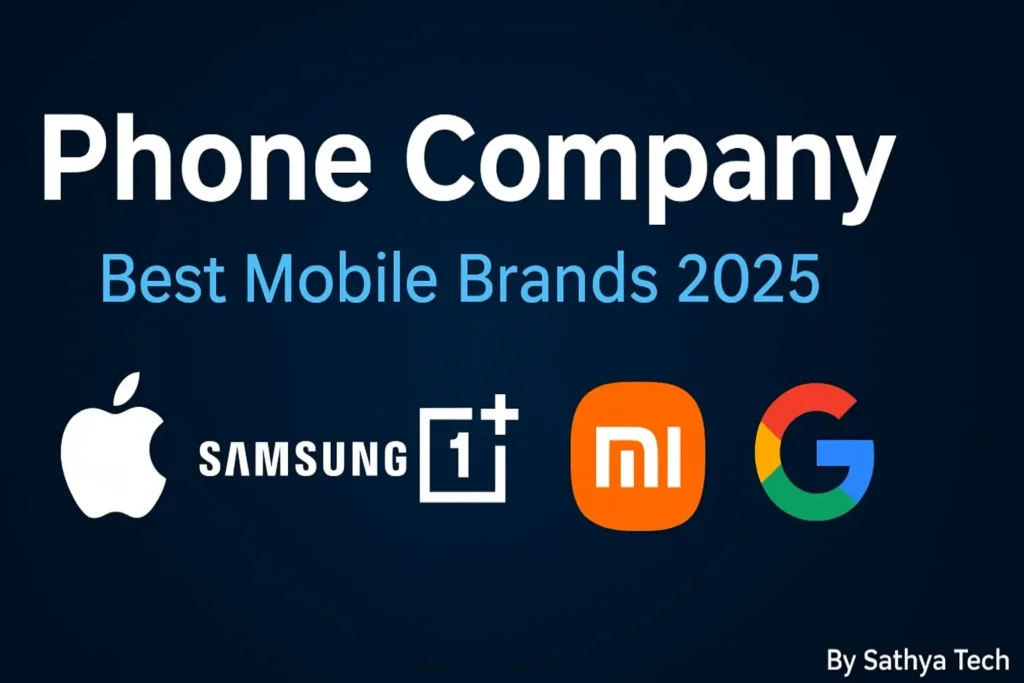Introduction: The Power Behind Every Smartphone
In today’s digital era, the word “phone companies” means far more than just a brand name printed on a device. It represents innovation, technology, design, and the dreams of millions of users worldwide. Every time we unlock our phones, we’re holding years of research, thousands of engineering hours, and the identity of a phone company that aims to make life smarter and simpler.
But what exactly does a phone company do? How do these global giants compete? Which are the best and what makes them different? Let’s dive deep into the fascinating world of mobile manufacturers and uncover everything from how they work to their unique themes and headquarters.

Table of Contents
How a Phone Companies Works
A phone company is a tech organization that designs, develops, manufactures, and markets mobile phones and related accessories. But behind this simple definition lies a complex and interconnected process involving multiple departments and global collaborations.
Research and Development
Every top phone company invests heavily in R&D to stay ahead. Teams of engineers and designers experiment with:
- Display technology (OLED, AMOLED, LTPO)
- Camera sensors and AI image processing
- Chipsets (Qualcomm Snapdragon, Apple A-series, MediaTek Dimensity)
- Software integration and user interface
This is where the innovation happens — where new features like foldable screens, AI camera modes, and satellite communication begin.
Design and Engineering
Design is the soul of every smartphone. Companies like Apple and Nothing focus on minimalism, while Samsung and Oppo push futuristic curves and colors. The goal is to create phones that feel good to hold, look stunning, and reflect brand identity.
Manufacturing and Supply Chain
Most companies don’t build every component themselves. For example:
- Apple designs iPhones but manufactures them through Foxconn and Pegatron in China and India.
- Samsung makes its own displays and chips.
- Xiaomi sources components from global suppliers.
This global supply chain helps keep costs optimized and quality consistent.
Marketing and Branding
A phone’s success depends not just on specs but on how it’s presented. Marketing teams create emotional connections — like Apple’s “Think Different” or Samsung’s “Do What You Can’t.” Strong storytelling builds long-term customer loyalty.
After-Sales and Ecosystem
Modern phone companies don’t just sell devices — they build ecosystems. Services like iCloud, Samsung Pay, and Xiaomi Home keep users tied to their ecosystem, ensuring recurring engagement.
Types of Phone Companies
There are several kinds of phone companies operating globally, and understanding these types helps us know how they function.
1. Flagship or Premium Brands
These companies focus on innovation, design, and high-end performance. Examples include:
- Apple
- Samsun
- gGoogle
- OnePlus
They lead the industry with the latest features and powerful proceread
2. Mid-Range Focused Companies
These brands aim to balance cost and quality. Their phones bring premium features at a more accessible price:
- Xiaomi
- Oppo
- Vivo
- Realme
Perfect for users who want value for money.
3. Budget Phone Companies
Affordable phones with basic features for everyday use:
- Infinix
- Tecno
- Itel
- Lava
Popular in emerging markets like India and Africa.
4. Gaming and Performance-Oriented Companies
Focused on speed, cooling, and display refresh rates for gamers:
- Asus ROG
- RedMagic
- Black Shark
These phones pack massive batteries, RGB designs, and liquid cooling systems.
5. Legacy and Specialized Brands
Older or niche companies still have dedicated markets:
- Nokia (reliable build)
- Sony (camera and display quality)
- Motorola (clean software and affordable pricing)
Best Phone Companies in the World
Now let’s look at the best companies globally and what makes them stand out in today’s market.
Apple Inc
- Headquarters: Cupertino, California, USA
- Theme: Simplicity, premium quality, ecosystem integration
Why it’s the best:
Apple dominates with its iPhone line, unmatched build quality, and iOS optimization. It offers excellent long-term software updates and privacy protection.
2. Samsung Electronics
- Headquarters: Seoul, South Korea
- Theme: Innovation and versatility
Why it’s great
From foldable devices (Galaxy Z Fold series) to flagship powerhouses (S series), Samsung combines technology and reliability with premium design.
3. Google
- Headquarters: Mountain View, California, USA
- Theme: AI-powered simplicity
Why it’s great
Google Pixel phones are known for their pure Android experience, unmatched AI camera features, and real-time translation tools.
4. Xiaomi
- Headquarters: Beijing, China
- Theme: Innovation for everyone
Why it’s great
Xiaomi delivers flagship features at budget prices, with strong online communities and sub-brands like Redmi and Poco.
5. Oneplus
- Headquarters: Shenzhen, China
- Theme: Never Settle
Why it’s great
Known for offering high-end features at mid-range prices, OnePlus bridges the gap between flagship and value.
6. Oppo
- Headquarters: Dongguan, China
- Theme: Technology meets design
Why it’s great
Oppo focuses on camera innovation, fast charging, and stunning aesthetics, making it a favorite in the youth market.
7. Vivo
- Headquarters: Dongguan, China
- Theme: Photography and lifestyle
Why it’s great
Vivo’s strength lies in its camera system and trendy design, with series like X and V catering to premium and mid-range buyers.
8. Huawei
- Headquarters: Shenzhen, China
- Theme: Future connectivity and AI
Why it’s great
Even with trade restrictions, Huawei continues to innovate in 5G, camera technology, and chipset manufacturing.
Top Companies with High-End Mobile Phones
1. Apple – iPhone 15 Pro Max & iPhone 16 Series – Titanium design, A17 Pro chip, and best-in-class camera – Longest software support in the industry.
2. Samsung – Galaxy S24 Ultra & Z Fold 6 – AI integration, stylus support, and best display in the world – Foldable innovation leads the industry
3. Google – Pixel 9 Pro – Smart camera, pure Android, and advanced AI tools – Ideal for photography lovers
4. OnePlus – OnePlus 12 Pro – Flagship performance with OxygenOS smoothness – Known for fast charging and sleek design
5. Xiaomi – 14 Ultra – Leica-powered camera system and Snapdragon power – Premium feel with affordable pricing
6. Sony – Xperia 1 VI – Cinematic display, professional camera modes – Designed for creators and filmmakers
Themes, Brand Identity & Marketing Style
Every phone company has its own philosophy that shapes its marketing, product design, and user experience.
Apple – “Think Different” :- Focus on simplicity, elegance, and privacy. Every Apple product connects seamlessly with others in its ecosystem.
Samsung – “Do What You Can’t” :- Pushes boundaries with innovation — from foldable screens to advanced displays.
OnePlus – “Never Settle” :- Represents performance lovers who expect more from technology.
Oppo – “Inspiration Ahead” :- Blends creativity and photography innovation, especially for young users.
Xiaomi – “Innovation for Everyone” :- Makes flagship-like features affordable to the masses.
Vivo – “Joy of Humanity” :- Focuses on capturing life moments through stylish, camera-centric phones.
Huawei – “Building a Fully Connected World” :- Leads in 5G and AI development, representing futuristic tech ambition.
Future Trends in Phone Companies
The mobile industry never stops evolving. Here’s what’s coming next:
- AI-Driven PhonesMore AI tools like live translation, real-time editing, and personal assistants.
- Foldable and Rollable DisplaysSamsung, Oppo, and Motorola are leading in flexible screen tech.
- Sustainable ManufacturingCompanies are moving toward eco-friendly packaging, recycled materials, and energy-efficient factories.
- Satellite ConnectivityPhones connecting directly to satellites for emergency use, pioneered by Apple and Huawei.
- Longer Software SupportGoogle and Samsung now promise up to 7 years of updates — a major win for users.
- Global Expansion of Indian ManufacturingIndia is becoming a major hub for assembling and exporting smartphones worldwide.
Why Understanding Phone Companies Matters
Choosing the right phone company isn’t just about hardware — it’s about trust, reliability, and the future. Each company builds an identity around user experience:
- Apple focuses on ecosystem and security.
- Samsung delivers innovation and variety.
- Xiaomi targets value and accessibility.
- Google ensures AI integration and clean software.
Understanding these helps users make smarter buying decisions.
Final thought
Phone companies are the architects of our connected world. They create not just devices, but digital lifestyles — shaping how we communicate, create, and connect. From Apple’s premium design to Xiaomi’s affordability, from Samsung’s innovation to Google’s AI — every company adds a unique chapter to the story of technology.
As competition rises, only those that innovate, adapt, and care for users will define the future of mobile technology. So next time you pick up your phone, remember — it’s not just a gadget. It’s the result of a phone company’s vision to make life better, smarter, and beautifully connected.

